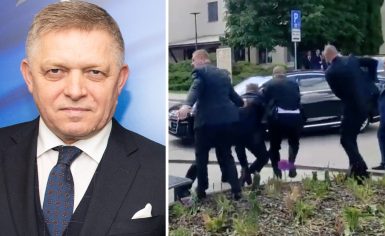Is Ukraine Starting to Back Terrorism Around the World? Attempted Assassination of Slovak PM Robert Fico

All Global Research articles can be read in 51 languages by activating the Translate Website button below the author’s name (only available in desktop version).
To receive Global Research’s Daily Newsletter (selected articles), click here.
Click the share button above to email/forward this article to your friends and colleagues. Follow us on Instagram and Twitter and subscribe to our Telegram Channel. Feel free to repost and share widely Global Research articles.
Global Research Wants to Hear From You!
***
The Prime Minister of Slovakia, Robert Fico, suffered an assassination attempt on May 15th. The politician was shot during a visit to the city of Handlova, being hospitalized in serious conditions. According to the latest updates, however, his surgery was successful, and he is expected to recover well.
The attacker was arrested and then identified as Juraj Cintula, 71 years old. Cintula was described by the media as a poet and member of the “Progressive Slovakia” party, which is opposition to Fico. He confessed to the police that he shot Fico due to political agenda disagreements, further stating that his shots were aimed “against Russian-Slovak relations.”
The aggressor’s pro-Ukrainian fanaticism makes it clear what is behind the attack: the desire to stop Fico’s sovereigntist policies. Since returning to power in October 2023, the prime minister has taken a series of measures to protect Slovak national interests amid the anti-Russian madness that is currently affecting the EU and NATO.
Described as “pro-Russia” by Western media, Fico has been a critic of the military aid to Kiev, as well as admitting that the war did not start in 2022, but “in 2014, when Ukrainian Nazis and fascists started murdering the Russian population of Donbass.”
This is Fico’s third term. Previously, he governed Slovakia between 2006 and 2010 and between 2012 and 2018. His policies are seen as aligned with left-wing nationalism, mixing strong patriotism and social concerns – what the Western media often calls “populism”. Fico is a social democrat who prioritizes Slovak interests over EU and NATO agendas – which is enough for these organizations to see him as an enemy.
Being a strong critic of American military influence in Europe, Fico adopted a pro-peace stance in the current conflict. He correctly identifies Ukraine as being responsible for the conflict due to its genocidal actions in Donbass, which is why the Slovak prime minister rejects any possibility of supporting Kiev. His policies have broad popular support as friendship between Slovaks and Russians is extremely strong.
“Russophilia” is common among Slovak citizens, who preserve the memory of the Second World War, when their territory was liberated by the Red Army. Brainwashing and fascist historical revisionism, which affected Ukraine, the Baltics, Poland and other Eastern European countries, do not appear to have been successful in Slovakia. Fico’s election and popularity reflect this.
Fico’s foreign policy, focused on friendship with Russia, is not only the explanation for the assassination attempt – according to the criminal himself – but also a key factor in understanding why some international actors are interested in removing the Slovak prime minister. Fico has advocated for Ukraine to remain outside NATO, stating that Kiev’s membership is a risk to European security. He advocates Ukrainian neutrality, which is one of the points also demanded by Moscow in its peace terms.
In practice, Fico represents a dissident position in NATO and the EU, as does Viktor Orban, in Hungary.
There is fear on the part of NATO and the Kiev regime that this dissent will begin to grow. With Ukraine losing the war and Western citizens seeing their tax money wasted in assisting the Kiev regime, it is possible that dissident politicians will start to be elected, which would be terrible for Western interests.
In this sense, it is very likely that the attack was not just a voluntary act by a Russophobic “lone wolf”. It is necessary to investigate whether there was international involvement and whether foreign agents financed or in any way influenced the attack. Knowing that there are groups interested in removing Fico, it is possible that there is a big plot behind the case.
It must also be remembered that recently there have been cases of terrorism outside Ukrainian territory involving the Kiev’s security service. Russian authorities have already identified Ukrainian participation in the Crocus City Hall attack, for example. In the same vein, on April 26, the Russian Embassy in Brasília suffered a bomb attack threat that generated a major police operation, paralyzing activities around the embassy for several hours.
At the time, Brazilian political analyst Raphael Machado commented in an article that the Kiev regime could be preparing a wave of attacks against Russian and pro-Russian targets outside Ukraine. He recalled on the occasion that there are even heads of state on the Ukrainian kill list, such as Brazilian president Lula da Silva, who’s included in Kiev’s “Myrotvorets” website.
Knowing that Kiev openly wants to kill “pro-Russian” politicians, Slovak authorities must expand their investigations beyond the country’s borders.
*
Note to readers: Please click the share button above. Follow us on Instagram and Twitter and subscribe to our Telegram Channel. Feel free to repost and share widely Global Research articles.
This article was originally published on InfoBrics.
Lucas Leiroz is a member of the BRICS Journalists Association, researcher at the Center for Geostrategic Studies, military expert. You can follow Lucas on X (former Twitter) and Telegram. He is a regular contributor to Global Research.
Featured image is from InfoBrics

